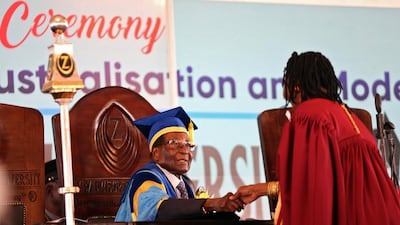Free university education in South Africa is very much a product of a movement and its hashtag - #feesmustfall.
Beginning with a series of rolling protests, the "fallists" as they became known, have defined campus life in South Africa for the past two years.
Fresh from the success of forcing the University of Cape Town to remove the statue of the institute's founder, Cecil John Rhodes, students began agitating for free tuition including subsidised board, travel and other expenses.
Protests began peacefully but as time went on, became increasingly violent. The slogan “Burn to be heard” became part of the protests. Arson, attacks on security guards and threats against lecturers became part of the movement's fabric. A priceless library of law books was destroyed at the University of KwaZulu-Natal and artwork burned at the University of Cape Town, among other acts of vandalism.
By mid-2016 damage of around 600 million rand was tallied at 18 of the country's 26 universities, according to University South Africa, a body that collectively represents higher learning institutions.
Student grievances revolved around the lack of finance for poor students, many of whom were forced to sleep rough – in campus libraries, outdoors and wherever they could find a place to lay their heads.
_______________
Read more:
American educator Stephen Ritz on his one-of-a-kind green classroom
Oxford graduate loses £1m lawsuit over failed first-class degree
_______________
Although there is a government-funded bursary scheme for poor students, it is at times chaotically administered. In 2017, for instance, a student was accidentally credited with 14m rand – enough to buy a fleet of luxury cars. She went on a wild spending spree, on iPads, holidays and makeovers for her and her friends, before the mistake was discovered and she was charged with theft.
Much of the student ire was directed personally at the president of the country, Jacob Zuma. Student marches brought cities to a standstill, and the inevitable hashtag #zumamustfall became part of the fallist movement.
With protests now part of campus life, Mr Zuma appointed a commission of inquiry to look into free university education. Its findings were released in November 2017 and were unequivocal: "There is insufficient financial capacity in the state to provide totally free higher education and training to all who are unable to finance their own education, let alone to all students, whether in need or not," the executive summary of the commission’s report said.
Then, a month later, despite the report, Mr Zuma announced that free university education would be introduced anyway.

